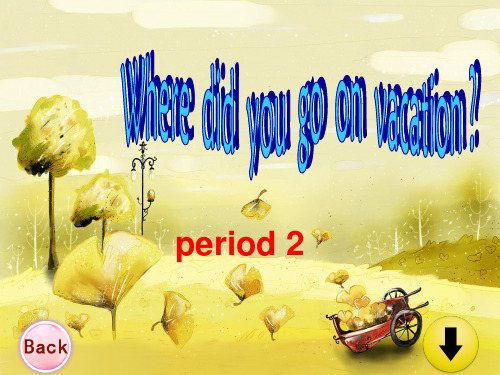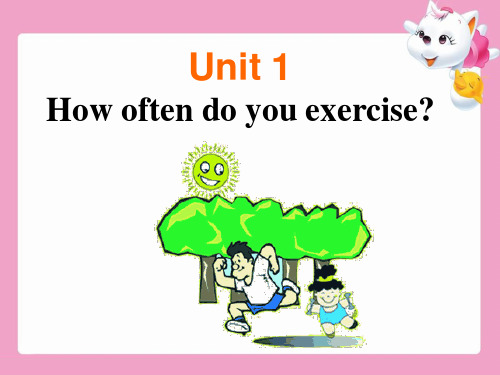新人教版八年级上册 英语UNIT1 讲义
- 格式:doc
- 大小:93.00 KB
- 文档页数:11

人教版英语八年级上第一单元Unit1Wheredidyougoonvacation知识点梳理Unit 1 Where did you go on vacation?知识梳理一、词型转换Section A1.wonder →(adj.) wonderful2.I →(反身代词) myself3.you →(反身代词) yourself4.yourself →(pl.) yourselves5.seem →(pt.) seemedSection B1.activity →(pl.) activities2.decide →(n.) decision3.try →(pt.) tried4.bike →(同义词) bicycle5.build →(n.) building6.difference →(adj.) different7.like →(反义词) dislike8.below →(反义词) above二、短语归纳Section A1.go to Central Park 去中央公园2.on vacation 在度假3.buy something special 买特别的东西4.meet someone interesing 遇见有趣的人5.go out with someone 和某人一起出去6.take quite a few photos 拍相当多的照片7.most of the time 大多数时间8.go shopping 去购物9.keep a diary 记日记10.of course 当然;自然Section B1.have a good time 玩得高兴;过得愉快2.go to the beach 去海滩3.feel like 感觉像4.the houses of the Chinese traders 中国商人的房子5. a lot of new buildings 许多新的建筑物6.in the past 在过去7.over an hour 一个多小时8.too many people 太多的人9.get to the top 到达顶部10.because of the bad weather 因为不好的天气11.one bowl of fish 一碗鱼肉12.another two hours 另外两个小时13.the top of the hill 山顶14.learn something important 学习重要的东西Self Check1.go to the countryside 去乡下2.in the shopping center 在购物中心3.have a fun time 玩得高兴;过得愉快4.after three hours 三个小时以后5.keep going 一直走6.twenty minutes later 20分钟后重点句子1.Where did you go on vacation?你去哪儿度假的?2.Long time no see.好久不见。



初中英语学习资料madeofjingetiejiUnit1 复合不定代词精讲及考点分析沂水县实验中学孟祥敏复合不定代词的组成:复合不定代词是由 some, any, no, every 加 -body,-thing,-one 组成,列表以下:Somebody 某人Anybody 任何人Someone 某人Anyone 任何人Something 某物,某事Anything 任何事物Nobody 没有人Everybody 每人No one 没有人Everyone 每人Nothing 没有东西Everything 全部因为在使用中有比较特别的习习用法,是考试中比较常有的考点。
一:复合不定代词和部分否认部分否认是考试中的热点考点,常表达的构造有两种:1:not+所有一定词2:助动词+not+ 所有一定词。
其意都为“并不是都,不都”。
前者是一般形态,如:Not everyone likesEnglish. 因为是基本观点,学生比较简单理解。
但后者和一般否认句比较相像,简单惹起学生判断上的迷惑,是出题的焦点。
1. I agree with most of what you said, but I don’ t agree with ______.A. everything B: anything C. something D. nothing剖析:有同学看到I don ’t agree就判断能否认句,选B, anything .这就是对句子理解出现了偏差。
句意是:我赞同你所说的大多数,但不是所有。
是一句典型的部分否认形式。
not everything 的构造表示“并不是每件事”。
因此正确答案是 A. everything。
2. ----The exam was di fficult, wasn’ t it?---- No, but I don’ t think ______ could pass it.A. somebodyB. anybodyC. nobody D everybody分析:同上题一样,不能将I don’t think简单得看成否定句而选 B. anybody 。


新人教版八年级英语上册Unit1 教案Unit 1: Where Did You Go on n?In this unit。
we will be learning about ns and travel。
Our goal is to master the keywords and phrases associated with this topic。
such as New York City。
Central Park。
anyone。
and anywhere。
We will also focus on using XXX.One of the key sentences we will be practicing is "Where did you go on n?" We will learn how to answer this n by using the correct verb tense and n。
For example。
"I went to New York City."Another XXX will practice is "Did you buy anything special?" We will learn how to respond by using the appropriate vocabulary and grammar。
For instance。
"Yes。
I bought something special for my dad."Throughout this unit。
we will work on XXX.To begin。
let's start by greeting each other and asking about our summer holidays。
We can ask ns like "Did you have a good time?" and "What did you do on n?" We can also ask more specific ns like "Did you go anywhere interesting?" and "Did you do anything fun?"As we move forward。
八年级上册英语unit1讲解
今天咱们一起来瞧瞧八年级上册英语的Unit1。
这个单元呀,就像是打开了一扇通往新朋友世界的大门,特别有趣呢!
在这个单元里,我们会学到好多和新朋友交流的英语表达哦。
想象一下,假如你到了一个新的学校,周围都是陌生的面孔,这时候你是不是很想和他们交朋友呀?比如说,你看到一个看起来很友好的同学,你可以走上前去,微笑着用英语打招呼:“Hi! What's your name?”(嗨!你叫什么名字呀?)瞧,这样简单的一句话,就能让你们的交流开始啦!
再比如说,当你知道了对方的名字后,你可以接着说:“Nice to meet you.”(很高兴认识你。
)对方也会友好地回应你:“Nice to meet you, too.”(我也很高兴认识你。
)就像这样,几句简单的英语,能让你们之间的距离一下子就拉近了呢!
还有哦,这个单元还会教我们怎么询问对方的兴趣爱好。
比如说,你想知道新同学喜欢做什么,你就可以问:“What do you like doing in your free time?”(你空闲时间喜欢做什么呀?)要是对方喜欢踢足球,他可能就会回答:“I like playing soccer.”(我喜欢踢足球。
)这样一来,你们就能找到共同的话题啦,说不定还能约着一起去踢足球呢!
英语就像是一把神奇的钥匙,能帮我们打开和新朋友交流的大门。
在这个单元里,我们会学到好多这样有用又好玩的英语句子,让我们能和世界各地的小伙伴们愉快地“聊天”哦!让我们一起加油,把这个单元的知识都装进小脑袋里吧!。
Unit1 Where did you go on vacation? 一、重点短语 go on vacation去度假stay at home待在家里go to the mountains去爬山 go to the beach去海滩visit museums 参观博物馆 go to summer camp去参观夏令营 quite a few相当多study for为……而学习go out出去 most of the time大部分时间taste good尝起来很好吃have a good time玩得高兴 of course当然 feel like给……的感觉;感受到go shopping去购物 in the past在过去walk around四处走走 because of因为 one bowl of… 一碗…… the next day第二天drink tea喝茶 find out找出;查明go on 继续 something important重要的事 up and down上上下下come up出来take photos照相
二、句型集萃 buy sth. for sb. / buy sb. sth.为某人买某物 taste + adj. 尝起来…… seem+(to be)+ adj. 看起来……keep doing sth.继续做某事 arrive in+大地点 / arrive at+小地点到达某地tell sb. (not) to do sth. 告诉某人(不要)做某事 try doing sth.尝试做某事 / try to do sth.尽力去做某事 decide to do sth.决定去做某事 forget doing sth.忘记做过某事/ forget to do sth.忘记做某事 enjoy doing sth.喜欢做某事want to do sth.想去做某事 stop doing sth. 停止做某事dislike doing sth. 不喜欢做某事 Why not do. sth.?为什么不做……呢?so+adj.+that 如此……以至于…… look+adj. 看起来……start doing sth.开始做某事
三、单元重点、难点、考点精讲 (一)Section A 1.Where did you go on vacation?你去哪里度假了?(P1) 1)这是有疑问副词where引导的特殊疑问句,where用来询问地点和场所,放在句首。 a._____ do you _____ ______?你从哪里来? b._____does he______?他住在哪里? 2)go on vacation意为“去度假”。 I want ____ ____ ____ ____in Hainan this winter.今年冬天我想去海南度假。 2.visited my uncle看望了我的叔叔(P1) visit是及物动词,意为“拜访;探望”,后接表示人的名词或代词。 visit还可以意为“参观;游览”,后接表示地点的名词。 a.I visited my grandmother last week. 上周我去______了我的外婆。 b.Do you want to visit Shanghai? 你想______上海吗? 拓展:visitor意为“参观者;游客”。 eg:These visitors come from America._______________________ 3.buy anything special买特别的东西。(P2) 1)buy及物动词,意为“买;购买”。其过去式为______。 拓展:buy sth. for sb.=buy sb. sth.意为“给某人买某物”。 My uncle_____ _____a bike. = My uncle_____ _____for me. 2)anything不定代词,意为“某事;某件东西”,主要用于疑问句或否定句中。 a.Do you want anything from me? b.I can’t say anything about it. 3) anthing special表示“特别的东西”,形容词修饰不定代词时后置。 a.Is there________ ________in this book?这本书里有新的内容吗? 4.Oh,did you go anywhere interesting?哦,你去有趣的地方了吗?(P2) 1)本句是did开头的一般疑问句 2)anywhere用作副词,意为“在任何地方”。 eg:Did you go anywhere during the summer vacation? 辨析:anywhere与somewhere anywhere意为“在任何地方”,常用于否定句和疑问句中。eg:I can’t find it anywhere. somewhere意为“在某处;到某处”,常用于肯定句中。eg:I lost my key somewhere near here. 5.We took quite a few photos there.我们在那里拍了不少照片。(P2) take photos 意为“照相;拍照”。 eg:We______ ______on the Great Wall.我们在长城上照了相。 辨析:quite a few与quite a little quite a few意为“很多;不少”,修饰可数名词复数; quite a little意为“很多;不少”,修饰不可数名词。 a.He stays here for _____ _____ _____days. b.There is _____ _____ _____water in the bottle(瓶子). 6.I just stayed at homemost of the time to read and relax.我大部分时间只是待在家里读书休息。(P2) most of the time意为“大部分时间”,其中most为代词,意为“大部分;大多数”。 拓展:most of…意为“……中的大多数”,它作主语时,谓语动词取决于most of后所修饰的名词。 a. Most of us_____(be)going to the park.我们大多数人要去公园。 b. Most of the food_____(go)bad.大部分的食物都变质了。 7.Everything tasted really good!所有的东西尝起来真的很好吃!(P3) taste在此为系动词,意为“尝起来”,其后接形容词构成系表结构。 a.The food tastes really great.食物尝起来棒极了。 8.Did everyone have a good time?大家都玩得很开心吗?(P3) have a good time = enjoy oneself = have fun 玩得开心(+ doing) eg:We hada good timevisiting the the Great Wall. = We enjoyed ourselves visiting the the Great Wall. = We hadfunvisiting the the Great Wall. 9.How did you like it?你觉得它怎么样?(P3) How do/did you like……?意为“你觉得……怎么样?”,用来询问对方的观点或看法,相当于 What do you think of……? eg:How do you like your new job? = _____ _____ _____ _____ your new job? 10.Did you go shopping? 你们去购物了吗?(P3) go shopping意为“去购物;去买东西”,同义短语为do some shopping. eg:I usually go shopping on Sundays.我通常星期天去购物。 拓展:“go+doing”形式表示“去做某事”,常用于表达从事某一体育活动或休闲活动。 go skating去滑冰go hiking去远足 go sightseeing去观光go fishing去钓鱼 go swimming去游泳go boating去划船 11.I went to a friend’s farm in the countryside with my family.我和家人一起去了乡下一个朋友的农场。(P3) a friend’s farm是名词所有格形式。 一般情况下,表示“有生命的人或物”的名词后面加’s,表示所属关系。 eg:The red bike is Alice’s.那辆红色的自行车是爱丽斯的。 拓展:名词所有格的构成: 1)单数名词词尾加’s,复数名词词尾没有s,也要加’s the girl ‘s pen女孩的钢笔 women’s shoes女鞋on Children’s Day 2)复数名词以s结尾的只加’ the students’ reading room学生阅览室Teachers’ Day教师节 3)如果两个名词并列,并且分别有’s,则表示“分别有”;只后一个名词有一个’s,则表示“共有”: John’s and Kate’s rooms. 约翰和凯特(各自)的房间。 Lily and Lucy’s father. 莉莉和露西的爸爸(同一个爸爸)。 4)表示无生命的名词一般以...of...构成短语,表示所有关系。 a map of China一幅中国地图 the name of the story那个故事的名字 12.Still no one seemed to be bored.(即使这样)仍然没有人看起来无聊。(P3) 1)seem意为“好像;似乎;看来”。 eg:Everything seems easy.一切似乎很容易。 拓展:a.seem+adj.“看起来……”。You seem happy today.你今天看起来很高兴。 b.seem+to do sth.“似乎,好像做某事”。I seem to have a cold.我似乎感冒了。 c.It seems/seemed+从句“看起来好像…;似乎…”。 It seems that no one believes you.看起来好像没有人相信你。 2)辨析:bored与boring a. bored意为“厌烦的;感到无聊的”,一般在句中修饰人。